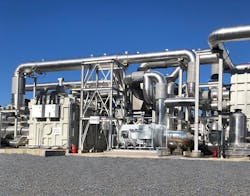Gas-powered Fuel Cell now operational at Navy submarine base
FuelCell Energy has completed site construction and commenced commercial operations of its 7.4-MW fuel cell project at the U.S. Navy Submarine Base in Groton, Connecticut.
The grid resiliency and microgrid ready clean energy project, which runs on natural gas to generate electricity, started operations on December 16. During the first year of operation, the project will operate at around 6 MW.
“FuelCell Energy is proud to deliver a solution that supports the Navy’s decarbonization goals while encouraging clean energy partnerships and policies that enable the deployment of crucial grid modernization technology needed for the electrical grid in Connecticut and around the world,” Jason Few, President and Chief Executive Officer, FuelCell Energy, said in a statement.
Fuel cells use an anode and cathode to convert fuel, usually natural gas or hydrogen, into electricity. FuelCell Energy utilizes its own solid oxide platform for the technology.
FuelCell Energy teamed up with East West Bank on a $15 million tax equity financing transaction to construct the project over three years.
The project brings the company’s total generation operating portfolio to 43.7 MW.
About the Author
EnergyTech Staff
Rod Walton is head of content for EnergyTech.com. He has spent 17 years covering the energy industry as a newspaper and trade journalist.
Walton formerly was energy writer and business editor at the Tulsa World. Later, he spent six years covering the electricity power sector for Pennwell and Clarion Events. He joined Endeavor and EnergyTech in November 2021.
He can be reached at [email protected].
EnergyTech is focused on the mission critical and large-scale energy users and their sustainability and resiliency goals. These include the commercial and industrial sectors, as well as the military, universities, data centers and microgrids.
Many large-scale energy users such as Fortune 500 companies, and mission-critical users such as military bases, universities, healthcare facilities, public safety and data centers, shifting their energy priorities to reach net-zero carbon goals within the coming decades. These include plans for renewable energy power purchase agreements, but also on-site resiliency projects such as microgrids, combined heat and power, rooftop solar, energy storage, digitalization and building efficiency upgrades.
